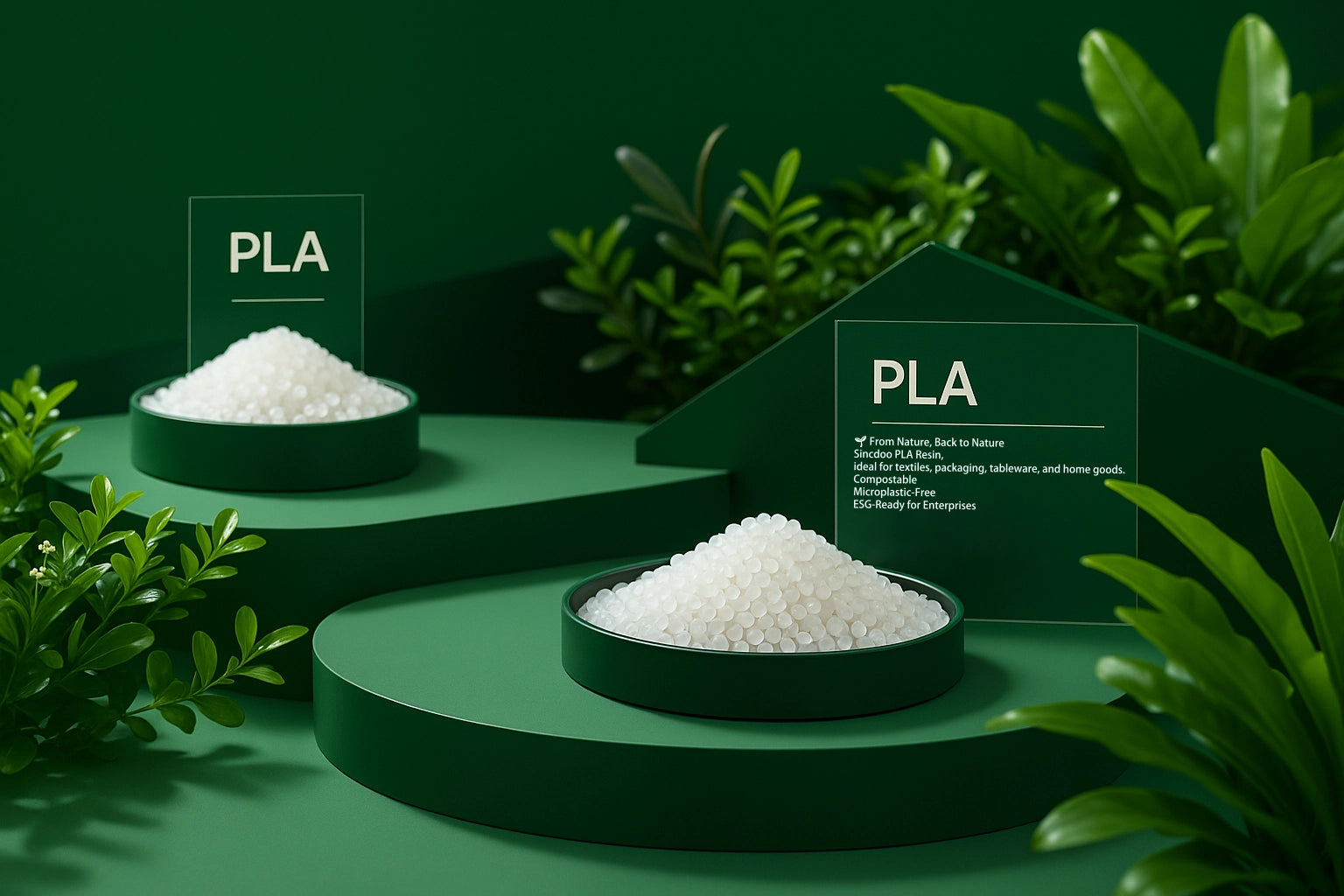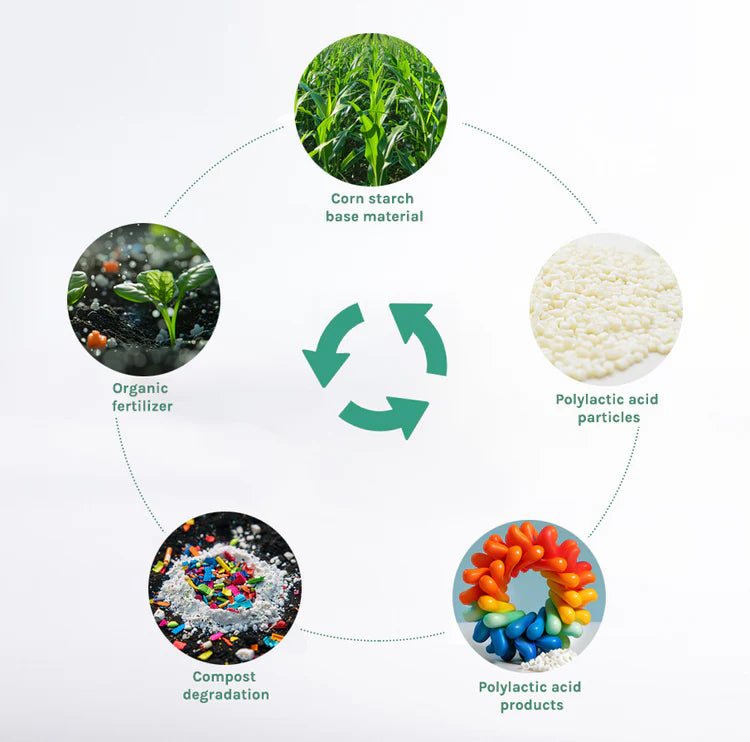
關於 Sincdoo PLA
PLA 生物塑料代表了開發更環保、更可持續材料的一大進步,旨在為地球帶來更健康的環境。
PLA 提供了一種有效的材料解決方案,可通過其環保性、可再生資源和應用多樣性來減少環境污染並推動可持續發展。
Sincdoo生物科技有限公司是ZB集團的子公司,專注於聚乳酸(PLA)產品的研究與應用。ZB集團是中國的大型服裝製造企業,為眾多知名品牌提供OEM服務,涵蓋西裝、運動服、休閒服、外套、大衣、內衣、兒童服裝及家用紡織品等領域。此外,ZB集團亦開發針對特定應用的專業面料。
作為ZB集團的一員,Sincdoo致力於可持續、可生物降解產品的開發與應用。利用ZB集團強大的設計及供應能力,我們在聚乳酸纖維衣物、聚乳酸日常產品和聚乳酸醫療用品領域提供創新解決方案和高品質產品。
原料採購:
市場上大多數生物可降解材料源自主要作物,Sincdoo則致力於選擇對食品供應影響較小的高品質、更負責任的聚乳酸原料。我們優先採購如稻草、甘蔗及少量基因改造玉米等原料,這些材料通常是農業副產品或高產作物,不會顯著影響全球食品供應。此外,發酵的副產品還可用於其他產品的生產。
此原料採購策略不僅減少了對食品資源的競爭,也堅守可持續發展原則,促進環保及資源效率。Sincdoo希望在推廣聚乳酸產品的同時,為全球糧食安全與生態平衡作出貢獻。
技術創新與研發能力:
聚乳酸改性顆粒產品:Sincdoo與國際知名的聚乳酸樹脂公司合作,如NatureWorks、Total Energies、Haizheng Bio和Fengyuan,根據特定產品特性定制改性聚乳酸原材料。
聚乳酸纖維:我們提供聚乳酸的短纖維和長纖維。通過生產線的升級和編織技術的改進,我們生產出高品質、多功能的面料。我們提供100%的聚乳酸面料,並根據客戶需求,亦提供適合不同使用環境的混合面料,幫助更多企業實現減碳目標。例如,我們用聚乳酸纖維替代聚酯纖維,大幅減少了石油基產品的使用。我們的聚乳酸與羊毛混紡面料確保了穩定性能,同時避免了使用棉花和石油基材料,並減少了羊毛使用量,最終提升了動物福利和環保。此外,Sincdoo還提供由有機棉和RWS認證羊毛製成的混紡面料,以滿足不同地區客戶的需求。我們支持客戶以OEM方式生產聚乳酸面料和成衣產品。
聚乳酸日用品:我們提供定制的聚乳酸產品,包括日常必需品(刀、叉、匙、杯等)和3D打印材料,並可添加咖啡渣或稻殼,以創造獨特的外觀並增強環保效果。
聚乳酸醫療領域:我們為醫院提供一次性聚乳酸產品,如醫療床單和白大褂。
汽車與建材:我們還開發各種包含聚乳酸材料的環保產品,旨在最小化環境污染,並幫助相關企業減少碳排放。
Sincdoo的認證與團隊:
我們提供各種認證,包括DIN、TÜV、BPI等。Sincdoo擁有專業的研發與設計團隊,與知名研究機構和大學合作,共同開發高品質產品。我們的設計師來自全球知名的服裝公司,能夠提供定制化的高品質產品開發解決方案,與客戶合作。
Sincdoo聚乳酸回收解決方案:
由於地區政策差異,並非所有地區都配備生物堆肥和降解設施。因此,我們提供幾種聚乳酸回收解決方案:
堆肥:在具有堆肥設施的地區,客戶可以直接堆肥並降解聚乳酸產品。
回收再利用:我們與中國的回收商合作,回收聚乳酸產品,將其壓碎並擠壓成用於室內外裝飾的地板材料。
焚燒:在電力短缺的地區,聚乳酸產品完全燃燒產生水和二氧化碳,與化學產品相比,顯著減少環境污染。
酶解降解:Sincdoo與XIKE Enzyme合作,開發加速聚乳酸降解的酶制劑,旨在進一步展示聚乳酸在生物可降解領域的優勢。
*研究表明,即使聚乳酸在自然環境中緩慢分解,也不會形成微塑料危害。
https://www.businesswire.com/news/home/20240620796233/en/New-Meta-Study-Highlights-That-Hydrolysis-Prevents-the-Formation-of-Persistent-PLA-Microplastics-in-the-Environment
-
環保友好
PLA 是可生物降解的,意味著它可以在工業堆肥設施中分解為水和二氧化碳,顯著減少環境影響。與傳統的石油基塑料相比,PLA 的生產和分解排放的溫室氣體更少,有助於緩解氣候變化的影響。此外,PLA 的降解過程不會產生有害的微塑料,這對保護水生和土壤環境至關重要。
-
可再生資源
PLA 來源於玉米澱粉、甘蔗等作物,這些都是可再生資源。這與從有限化石燃料生產的傳統塑料形成鮮明對比。利用可再生資源不僅有助於減少對化石燃料的依賴,還促進了可持續農業,為農業副產品創造新價值。
-
應用的多樣性
PLA 優秀的物理和化學性能使其廣泛應用於各個領域,包括包裝材料、一次性餐具、紡織品、醫療用品和3D打印材料。這種多樣性使PLA成為滿足不同產業對環保材料需求的高度靈活材料。PLA的多樣應用展示了其在促進環境可持續性和支持綠色經濟增長方面的巨大潛力。


聚乳酸(PLA)的永續生命週期
聚乳酸(PLA)是一種突破性的永續材料,具備完整的循環生命週期。PLA取自稻稈、玉米澱粉、甘蔗等可再生資源,加工後可製成多元化產品。這些產品於使用後可透過堆肥自然分解,最終轉化成有機肥料、水及二氧化碳。此環保循環過程有效減少廢棄物,保護生態環境,有助於創造更加綠色且永續的未來。
關於聚乳酸 (PLA) 的常見問題
為什麼 PLA 被認為是環保的?
PLA 被認為是環保的,因為它來源於如玉米澱粉或甘蔗等可再生資源,這些資源在生長過程中吸收CO2,減少溫室氣體排放。此外,PLA 在適當條件下能完全生物降解,減少長期環境污染。
如果 PLA 被意外丟棄在環境中,對健康和環境有什麼影響?
相比傳統塑料,PLA 因其可生物降解性,不會在環境中持續存在並產生微塑料,從而降低對環境和人體健康的潛在危害。
PLA 的生物降解性是如何實現的?
PLA 的生物降解性是在工業堆肥環境的高溫和高濕條件下,特定分子鏈斷裂,最終分解為二氧化碳和水。這需要特定的堆肥設施。
應用 PLA 的優勢
PLA 的應用優勢在於其多樣性和可定制性。它可用於製造包裝材料、一次性餐具、服裝產品、耐用商品、生物醫療產品,甚至汽車內飾產品。通過添加不同的添加劑,PLA 還可以提高耐熱性或改變其生物降解率,以滿足各種領域的需求。
PLA 與其他生物塑料的不同之處
相比其他生物塑料,PLA 在生物降解性、原材料來源和生產過程的環境影響方面通常表現更好。PLA 的原材料主要是農作物,這使其在減少對化石燃料依賴方面具有明顯優勢。
使用 PLA 產品在安全和健康方面的優勢
PLA 產品在安全和健康方面提供了多項顯著優勢,尤其是在食品包裝和容器以及嬰幼兒產品中:
- 不釋放有害物質:PLA 由天然可再生資源製成,不含對人體健康有負面影響的有害雙酚 A (BPA) 或其他化學物質。相反,一些傳統塑料在接觸食物或暴露於熱量時可能會釋放有害物質。
- 生物相容性:由於其生物基質性質,PLA 更適合人體,在醫療領域廣泛使用,如可生物降解的縫線和藥物傳輸系統,這表明 PLA 被認為對人體的毒性風險較低。
- 降低長期暴露風險:由於 PLA 是可生物降解的,使用它可以減少環境中微塑料的積累,從而減少人們通過食物鏈間接暴露於微塑料的風險。長期暴露於微塑料被認為可能對健康有不利影響。特別是在嬰兒玩具中,由於嬰兒的咀嚼習慣,可以防止嬰兒攝入塑料並對身體造成傷害。
- 更安全的廢物處理:PLA 產品的可生物降解性質意味著它們在適當的處理條件下可以完全分解,減少在廢物處理過程中釋放有害化學物質的風險。
關於 PLA 產品的常見問題
Sincdoo 聚乳酸 (PLA) 纖維的應用場景
Sincdoo 聚乳酸 (PLA) 纖維作為一種環保和健康意識的材料,提供了廣泛的應用範圍,不僅僅是填充材料,還涵蓋了紡織和服裝行業。作為填充材料,PLA 纖維是傳統合成填充物的理想替代品,增強了產品的健康性和可持續性,使其適用於嬰兒玩具、沙發等的填充材料。在服裝領域,PLA 纖維因其獨特的優勢而脫穎而出,如親膚性、抗菌特性、環保性、無毒性、耐污性、耐水性、輕便性和舒適性。這些特性不僅滿足了現代消費者對健康和環保服裝的需求,還推動了服裝行業朝著更可持續的發展道路前進。
Sincdoo 耐用 PLA 產品的應用場景和產品優勢
- 餐具:Sincdoo 的 PLA 餐具不僅環保且可生物降解,還具有優異的耐熱性和強度,適用於一次性和可重複使用的餐飲服務。它還可應用於嬰幼兒餐具領域,替代大多數塑料產品。
- 兒童硬玩具:PLA 材料的無毒性使其成為製造兒童玩具的理想選擇,確保安全的同時提供耐用性和強度,能夠承受日常磨損。
- 化妝品包裝盒:在化妝品包裝領域,PLA 不僅提供了一種環保的包裝解決方案,還通過其出色的外觀和可定制性提升品牌競爭力,提供了品牌提升的新可能性。
- 3D 打印材料:作為 3D 打印材料,PLA 因其環保性、打印機兼容性、美觀性、機械性能、健康安全性和成本效益而廣受業餘愛好者和專業人士的認可和讚賞。
Sincdoo 的耐用 PLA 產品不僅滿足了市場對環保、健康和高質量材料的需求,還為企業提供了探索新市場機會和提升品牌價值的有力支持。
聚乳酸在醫療用品領域的應用
聚乳酸 (PLA) 在醫療用品領域的應用展示了其作為一種生物相容和可生物降解材料的獨特優勢,包括:可吸收縫線、藥物傳輸系統、支架和植入物、組織工程、定制 3D 打印醫療設備、口罩、一次性醫療墊等。PLA 在醫療用品中的廣泛使用,不僅是由於其可生物降解性和生物相容性,還因其可定制性,為患者提供更個性化和有效的治療選擇。這些應用展示了 PLA 在促進可持續發展和醫療領域創新方面的重要作用。
聚乳酸 (PLA) 在汽車內飾中的應用
聚乳酸 (PLA) 在汽車內飾配件中的使用代表了邁向可持續和環保汽車製造的重要一步。我們目前的 PLA 產品範圍包括設計用於長期保護的耐用地墊、符合人體工學設計的頭枕以提升舒適度,以及多用途的手機支架以增加便利性。這些產品不僅展示了材料的多樣性和耐用性,還展示了其在汽車行業中減少環境影響的承諾。
聚乳酸 (PLA) 的回收
工業堆肥:PLA 是可生物降解的,但需要特定的工業堆肥設施,在高溫和適當的濕度條件下進行有效的分解。這種方法可以將 PLA 完全分解為水和二氧化碳。
化學回收:通過化學回收過程,PLA 可以解聚為其原始單體或其他有用的化學物質,然後可以在新的聚合反應中重新使用以創建新的 PLA 產品。
機械回收:雖然不像 PET 等傳統塑料那樣常見,但機械回收也可以應用於 PLA。這涉及將 PLA 產品物理研磨成小顆粒,然後清潔、熔化並重新加工成新產品。
能量回收:由於 PLA 是由有機材料製成的,因此可以通過焚燒來回收能量。雖然這不是最環保的回收方法,但在沒有其他回收選項的情況下,它可以將 PLA 轉化為能量而不是填埋。
